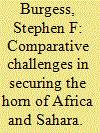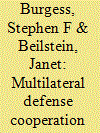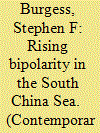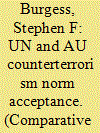|
|
|
Sort Order |
|
|
|
Items / Page
|
|
|
|
|
|
|
| Srl | Item |
| 1 |
ID:
139503


|
|
|
|
|
| Summary/Abstract |
Geography helps to explain why violent extremist organizations are difficult to counter; vast ungoverned spaces combined with weak states make it nearly impossible to decisively defeat them. However, partial success has been achieved by the United States in the Horn of Africa with a strategy of training, equipping, and supporting African intervention forces and attacking extremist leaders. In contrast, a strategy of containment in the Sahara, focusing on counterterrorism training for regional security forces and countering extremist ideology, did not succeed in preventing militant groups from taking over northern Mali and expanding their activities to other parts of the region.
|
|
|
|
|
|
|
|
|
|
|
|
|
|
|
|
| 2 |
ID:
087329


|
|
|
|
|
| Publication |
2009.
|
| Summary/Abstract |
AFRICOM was created in an authoritarian manner without answering the fundamental question is AFRICOM in the American nationa interest. There are fundamental challenges that AFRICOM will struggle to manage, and it seems quite possible that it will have a not-so-promosing future.
|
|
|
|
|
|
|
|
|
|
|
|
|
|
|
|
| 3 |
ID:
156924


|
|
|
|
|
| Summary/Abstract |
This article demonstrates that there are multiple strategies for state building, peace building, and security for civilian populations. In five cases of ongoing conflict, the liberal model of top-down state building and elections has caused considerable loss of lives and resources and could be considered to have failed. There are no long-term prospects for success in any of the five countries where the liberal model is being implemented with international assistance. The liberal model of power sharing followed by democratic elections has not provided greater protection from internal and external threats than would have one or more of the alternatives in four of the cases. In three of the cases, where there has been considerable bloodshed and displacement, freezing the conflict, separating the factions, and providing protection for civilian populations is an option that is less costly than the liberal model. Where conflicts are frozen, there can be international assistance for building the state in two or more sections. Where long-term prospects in building a unitary state are not good, freezing the conflict, protecting civilians, and sealing borders, as well as building the state from below, are less costly than the liberal model.
|
|
|
|
|
|
|
|
|
|
|
|
|
|
|
|
| 4 |
ID:
159150


|
|
|
|
|
| Summary/Abstract |
Some U.S. military leaders have asserted that the United States, Japan, Australia, and India and the Republic of Korea are developing multilateral defense cooperation to deter aggression and uphold norms much like North Atlantic Treaty Organization (NATO) has in Europe. Frequent military exercises and China’s threats to freedom of navigation (FoN) and North Korea’s nuclear missiles comprise the motive force for such cooperation. However, cooperation thus far has been trilateral and minimal, given divergent national interests and dispersed geopolitical locations. Cooperation among Japan, Republic of Korea (ROK), and the United States is increasing given the threat, but ROK’s public opinion is divided about Japan. Australia, Japan, and India have increased cooperation with the United States but are reluctant to conduct FoN operations with the United States to challenge China’s expansionism in the South China Sea. If China becomes more aggressive and blocks FoN or seizes territory, development toward an Asian NATO is possible.
|
|
|
|
|
|
|
|
|
|
|
|
|
|
|
|
| 5 |
ID:
144441


|
|
|
|
|
| Summary/Abstract |
This article synthesizes three elements of power and balancing in the South China Sea (SCS): analytical perspectives on China's behaviour and intentions, the American rebalance to Asia and the dispositions of American allies and partners. Based on extensive interviews and theoretical analysis, it concludes that ‘soft balancing’ backed by American military power provides the optimum chance for resolving the growing dispute. Short to medium-term weakness of Malaysia, Philippines and Vietnam, as well as Japan, means the United States must provide much of the military power while working to build their forces. The most promising alternative is multilateral diplomacy through the Association of Southeast Asian Nations’ Regional Forum, a vehicle for negotiating a Code of Conduct and implementation of the UN Convention on the Law of the Sea. If China remains motivated mainly by defense of realist interests, the costs imposed against expansion will eventually cause recalculation of Beijing's strategy, and soft balancing by the United States and its partners has a chance of working. The constructivist perspective, stressing self-conceptualization of Chinese strategic culture, supports Chinese confidence that patience will eventually bring dominance. If China tries offensively to change the status quo, soft balancing is less likely to influence Beijing. President Xi Jin Ping appears to be offensively asserting power, seeking regional dominance before he is due to step down in 2023. This supports the finding of enhanced risks of unintended escalation in the SCS and the East China Sea.
|
|
|
|
|
|
|
|
|
|
|
|
|
|
|
|
| 6 |
ID:
076714


|
|
|
|
|
| Publication |
2006.
|
| Summary/Abstract |
South Africa's transition away from being a U.S. ally toward being a neutral country was followed by the development and then rollback of a nuclear weapons program. In South Africa's case, paranoia that the United States was abandoning it was a significant motive for going nuclear. Realism does not fully explain South Africa's desire for nuclear weapons, since the country faced no major strategic threats. Paranoia about communists and the loss of the United States as a major ally increased South Africa's sense of insecurity, thus it began to develop weapons and missiles. U.S. pressure increased in the late 1980s, and in 1989 the apartheid government began the process of surrendering power. South Africa signed the NPT, and in 1990 and 1991, it unilaterally disarmed. Lessons from the South Africa case include the critical role played by leaders in setting the direction of a country's strategic policy, and the unintended consequences of Western programs to promote peaceful energy. Democratic reforms may prove to be a successful long-term factor in reversing the development of nuclear weapons.
|
|
|
|
|
|
|
|
|
|
|
|
|
|
|
|
| 7 |
ID:
150105


|
|
|
|
|
| Summary/Abstract |
Uganda and Chad both took risks to implement global counterterrorism (CT) norms by mounting expeditionary operations against violent extremist organizations (VEOs) because of the Pan-Africanist vision of Ugandan president Museveni and the more realist motivation of Chadian president Déby. The resources that the United States, France, and the EU have provided have enabled the two countries to execute difficult operations. Internally, both countries have worked to develop CT capacity but suffer from state weakness and the inability to raise the necessary resources to be fully able to track violent extremists, prevent VEO attacks, and arrest and try and terrorists. Uganda is ahead of Chad in developing its CT capabilities, which is a reflection of the relatively greater strength and resources of the Ugandan state. Both countries have worked with the UN and African Union in spreading global CT norms and leading by example for other states to follow. Uganda has been more active in spreading and advocating CT norms to the African Union and other bodies.
|
|
|
|
|
|
|
|
|
|
|
|
|
|
|
|
|
|
|
|
|